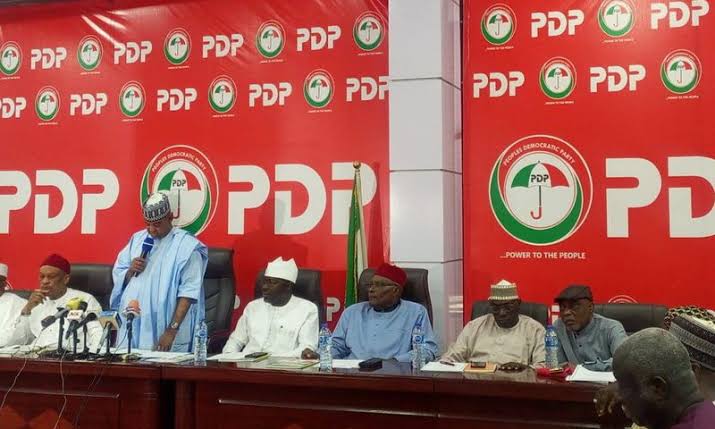PDP’s crisis: Is there hope left for Nigeria’s once-dominant party?

Members of the People’s Democratic Party (PDP) in a meeting. Photo Credit- Pulse Nigeria
The Peoples Democratic Party (PDP) finds itself in murky waters of irrelevance and structural collapse, drowned by a relentless wave of defections that have stripped it of its superior dominance in Nigerian politics. The latest blow came on April 23, when Delta State Governor Sheriff Oborevwori and other party members from the state defected to the All Progressives Congress (APC), joining the growing camps of defectors are potentially South-south governors, National Assembly members, and party stakeholders.
With the party’s influence reducing since its 2015 presidential loss, the question looms: Is there any hope for the PDP to reclaim its place as a viable opposition, or has its internal crisis and the APC’s aggressive consolidation reduced it to obscurity? The answer lies in a sad reality, unless the PDP confronts its leadership crises and rebuilds its ideological principles, its chances of resurgence is like the space between the West and the East, leaving Nigeria’s democracy in danger.
A party in collapse
The PDP’s crisis is clearly illustrated by the movement of its key figures. Oborevwori’s defection follows a pattern—Cross River’s Ben Ayade in 2021, Sokoto’s Aminu Tambuwal in 2014, and Ebonyi’s Dave Umahi in 2020, all abandoned the PDP for the APC, often aligning with federal power for personal gain. National Assembly members and stakeholders have followed suit. The PDP, which held the presidency from 1999 to 2015, has lost influence, particularly in strongholds like Delta, where Oborevwori’s exit risks fracturing local governance.
This mass defection is not just a loss of numbers, it is a betrayal of the PDP’s historical role as a broad-based party uniting Nigeria’s diverse regions. Political analysts highlights how cross-carpeting erodes democracy, and the PDP’s inability to retain loyalty shows its diminishing influence. Moreover, critics are pointing to internal power struggles, particularly Atiku Abubakar’s divisive 2018/2019 political maneuvers, as a root cause of the party’s current struggles.
RELATED STORIES
Opinion: Sheriff Oborevwori’s defection, a betrayal of democratic trust
Is Tinubu’s reelection more important than Nigeria’s economy?
Political parties: A special purpose vehicle for Nigerian politicians
PDP’s crisis and ideological drift
At the heart of the PDP’s crisis is a leadership void and ideological drift. The party, once a coalition of traditional chiefs, academics, and military elites, has lost its unifying vision. The 2015 presidential loss to Muhammadu Buhari, driven by internal factionalism and Goodluck Jonathan’s failure to address insurgency and corruption, exposed deep cracks. Subsequent leadership under Atiku and others failed to mend these fractures, with critics predicting on social media that Umo Eno of Awka Ibom might be the next then Fubara of Rivers state, who might be desperate to reclaim his position as the governor after his February suspension, signaling more defections. The PDP’s inability to present a cohesive opposition platform against Tinubu’s APC, which has consolidated power through strategic defections leaves it defenseless.
Moreover, the PDP lacks the ideological standard to inspire loyalty. Unlike parties in stable democracies, like the UK’s Labour Party, which rallied around a clear social-democratic agenda after its 2019 loss, the PDP has become a vehicle for personal ambition rather than principles. Political analysts notes that Nigerian parties often lack ideological depth, reflecting public doubt about the PDP’s maturity as a political force.
The APC’s dominance and its threat to democracy
The PDP’s decline is not just its own failure, it is a triumph of the APC’s aggressive consolidation under Tinubu, whose influence has drawn defectors like Oborevwori. But this consolidation comes at a cost to Nigeria’s democracy. A one-party state, as the APC’s dominance risks creating, could limit competition, which is a good example of a strong democracy. Political analysts also warn that weakened opposition leads to unchecked governance, a danger Nigeria cannot afford amis rising inflation and thousands of conflict fatalities since 2023.
The PDP’s failure to counter this trend, despite opportunities like the 2024 “End Bad Governance” protests shows a party out of touch with public anger. While the APC capitalizes on defections to secure 2027, the PDP remains weak, unable to gather disaffected Nigerians or defectors back into its camp.
Solutions, recommendations for PDP’s crisis
Is there hope or is the PDP’s crisis going to end? Perhaps, but only if it undertakes a total radical revolution. The party must return to its grassroots, leveraging its historical base; traditional leaders, academics, and youth to rebuild trust. A new leadership, that is free from the Atiku-Wike feuds that has been the basis for defection, is crucial. The PDP could also capitalize on public discontent with Tinubu’s policies, like the subsidy removal that spiked fuel to over N900 per liter or the killings in the northern region by offering a clear alternative vision, which they have failed to do since 2023.
Final take
The PDP’s future hangs in the balance. Its heavy defections signal a party on life support, unable to counter the APC’s dominance or inspire loyalty. Without addressing its leadership crises and ideological drift, the PDP risks fading into obscurity, leaving Nigeria with a dangerously unbalanced democracy. The party’s hope lies in a return to its roots and a renewed fight for the people but time is running out, the PDP must find its own light, or Nigeria’s democratic future will grow darker still.

